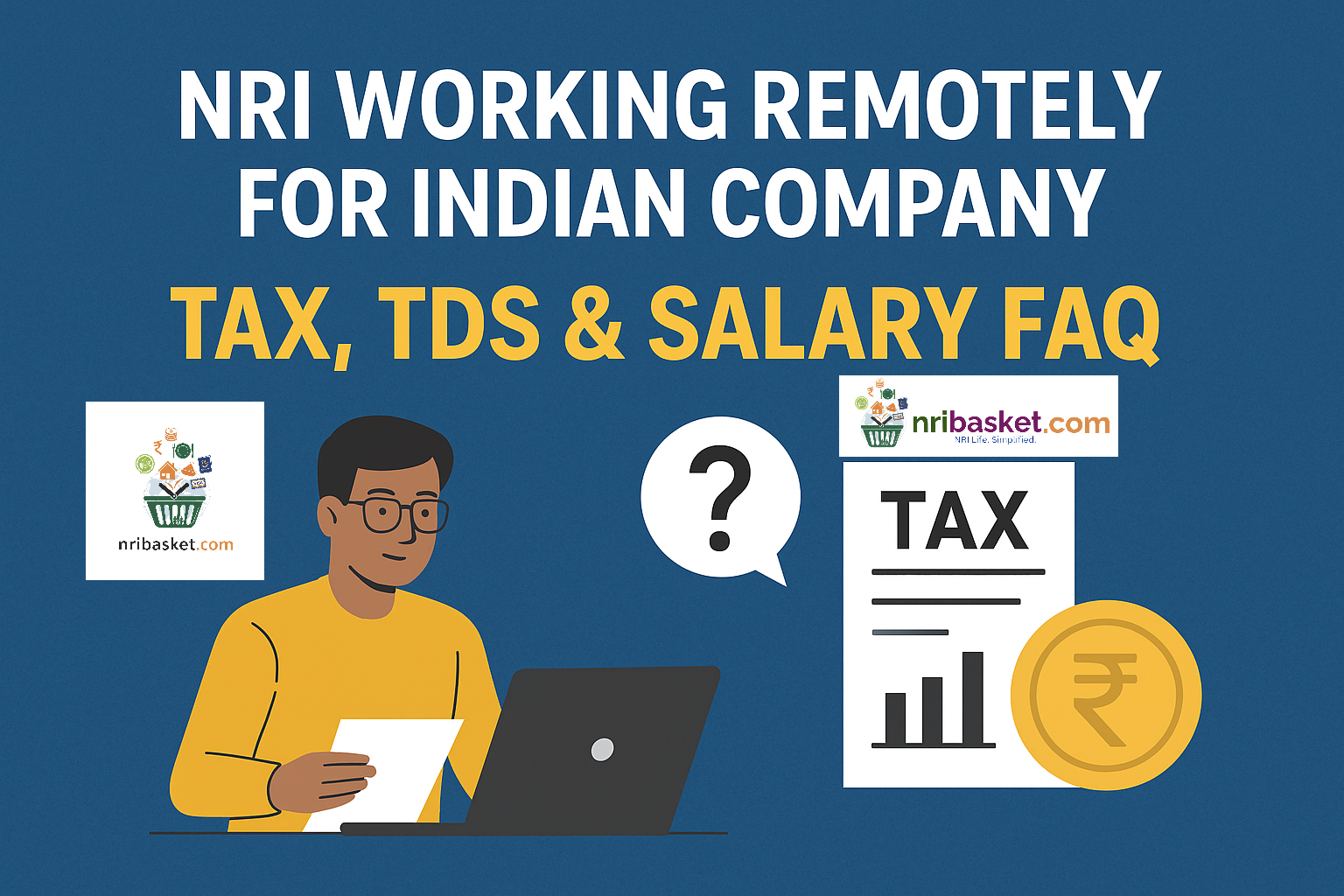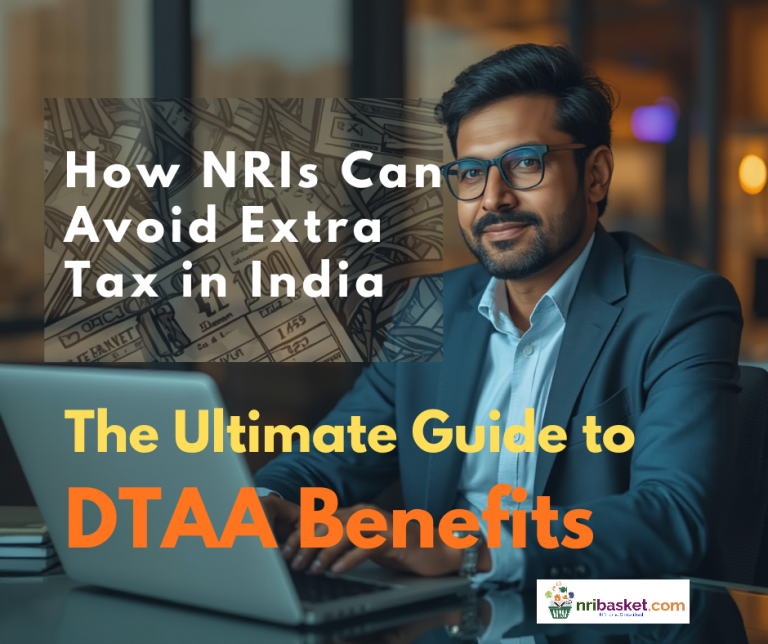
NRI Working Remotely for Indian Company – Salary, TDS & Tax FAQs 27 questions answered
More and more NRIs are now working remotely for Indian companies while living abroad. This brings up many important tax and salary-related questions. For example – which account should you use (NRE or NRO), how TDS will be handled, whether you will get a Form 16, and how to avoid double taxation under DTAA. If you are an NRI earning income from India, this guide will help clear your doubts in simple terms. We have compiled the most common questions and answers below so you can understand the rules better before accepting a remote role with an Indian employer.
Long Answer: Many NRIs work remotely for Indian employers from their country of residence. The key is handling tax, payroll, and banking correctly (NRO/NRE/foreign account), and making sure you follow both Indian rules and your resident country’s rules.
Long Answer: If the employer treats your payment as “salary” and deducts TDS, they normally issue Form 16 at year-end. The TDS and salary paid should also show up in your Form 26AS.
Long Answer: When the employer deducts TDS under “Income from Salaries,” it gets reported to the tax department. You’ll see the amount and TDS credit in your Form 26AS and Annual Information Statement (AIS).
Long Answer: If you have an employment contract and are on the company’s payroll, TDS is usually deducted as salary. If it’s a contract for services as an independent contractor, then TDS may fall under a different section. Your agreement decides the correct route.
Long Answer: Employers often credit INR salary to an NRO account. NRO is designed for income earned in India and for rupee receipts. If you want to move funds overseas, you can repatriate from NRO with required documentation.
Long Answer: Salary in INR is typically paid to NRO. NRE is mainly for foreign income. Some employers can pay to a foreign account if the arrangement allows and banking/compliance is set up, but this is not standard and needs extra checks.
Long Answer: If your resident country taxes your global income, you may claim foreign tax credit for Indian TDS/tax, using your country’s rules and India’s DTAA with that country. Keep Form 16, 26AS, and proof of tax paid to claim credit.
Long Answer: If you have taxable income in India, filing an income tax return in India is generally required even after TDS, especially to claim refunds, deductions, or reconcile income. Use the correct ITR form for NRIs.
Long Answer: Indian tax residency depends on days of stay in India during the financial year. If you qualify as NRI, India taxes mainly your Indian-sourced income. Keep travel records to determine your status each year.
Long Answer: In practice, payroll in India and a domestic employment contract usually mean the income is taxed in India as salary. Your resident country may also tax it as foreign income. Use DTAA/tax credits to avoid double tax.
Long Answer: A TRC from your resident country supports DTAA benefits and foreign tax credit claims. It shows where you are a tax resident. Keep it with your records along with Form 16/26AS and payslips.
Long Answer: As an employee, TDS is under salary, and you get Form 16. As a contractor, the company may deduct TDS under a different section and issue a TDS certificate, not Form 16. Choose based on benefits, compliance comfort, and your resident country’s treatment.
Long Answer: Salary is not subject to GST. If you are an independent contractor supplying services, GST questions can arise based on place of supply and registration rules. For pure employment income, GST does not apply.
Long Answer: Keep your employment contract, monthly payslips, Form 16, Form 26AS/AIS, bank credit proofs, TRC (if any), and any correspondence on TDS. These are needed for filing returns and claiming foreign tax credits abroad.
Long Answer: Banks allow repatriation from NRO up to permitted limits after paying due taxes. You may need forms, CA certificates, and proof of tax paid. Check your bank’s process before planning large transfers.
Long Answer: If you’re on Indian payroll as a regular employee, some statutory benefits may apply based on the law and company policy. If you’re a contractor, these usually don’t apply. Confirm terms in writing before you start.
Long Answer: Keep proof of Indian tax (Form 16, 26AS, challans). File your return in your resident country and claim credit for tax paid in India under DTAA or local laws. The method and limits vary by country, so follow local guidance.
Long Answer: PAN is required for Indian tax matters and TDS credit. Aadhaar rules for NRIs have special provisions. Keep your PAN active and updated with your bank and employer for smooth payroll and TDS reporting.
Long Answer: If TDS is short, you must pay the balance tax before filing your return in India to avoid interest. Review your Form 26AS during the year and plan any advance/self-assessment tax if needed.
Long Answer: Agree on a clear CTC, TDS handling, benefits, and payment account (NRO/foreign). Avoid complex allowances you can’t use abroad. Ask for a simple structure that fits both Indian payroll and your resident country filings.
Long Answer: Some countries may question if your work creates a taxable presence for the Indian company. Employers sometimes add wording in contracts and limit authority to reduce risk. This is more of an employer issue, but be aware.
Long Answer: If your India stay crosses certain day-count thresholds, you could become resident for tax. This changes how your global income is taxed. Plan your travel and keep a log so you don’t get surprises at year-end.
Long Answer: If you turn resident (or RNOR), your scope of taxation in India expands. You may still use DTAA and foreign tax credits, but the filing becomes more detailed. Track residency every year.
Long Answer: If full salary payroll is hard, companies sometimes hire NRIs as contractors. Then, TDS is deducted under a different section, and you raise invoices. This can be simpler for the company but changes your tax treatment and benefits.
Long Answer: Request a CTC breakup and TDS calculation, then review your 26AS mid-year. If needed, adjust declarations or pay advance tax to avoid interest. This keeps cash flow smooth and prevents year-end surprises.
Long Answer: (1) Confirm employee vs contractor in writing. (2) Share PAN and bank details. (3) Confirm TDS under salary and Form 16 timelines. (4) Use NRO for INR credits. (5) Keep payslips/26AS. (6) Track days in India. (7) Save documents for foreign tax credit.
Long Answer: Align your contract, payroll, TDS, and bank credits. Keep proofs handy for both countries. When unsure, get a quick review from a tax professional familiar with India and your resident country. It saves time and stress later.
Final Thoughts: Working remotely for an Indian company while staying abroad is completely possible for NRIs, but it requires clarity on tax rules, salary credits, and compliance. Most employers in India will deduct TDS and issue Form 16, while you may also need to check your local country’s tax laws and DTAA benefits to avoid double taxation. Always keep proper documentation, use the right bank accounts (NRE/NRO), and file your returns on time.
For personal guidance, it is best to consult a qualified tax expert who understands both Indian and international tax laws. And if you want more simple and practical guides on NRI money, moving, and lifestyle, make sure to bookmark NRI Basket and stay updated.
NRI remote job India tax,NRI working for Indian company remotely,NRI salary taxation India,NRI TDS on salary,NRI income tax return filing,NRO vs NRE account for salary,NRI double taxation India,Form 16 for NRI,DTAA rules for NRI income,PAN for NRI salary taxation,Can an NRI work remotely for an Indian company?
How is NRI salary taxed in India if working from abroad?
Will NRI get Form 16 if salary credited to NRO account?
Is TDS applicable for NRI working remotely?
How to avoid double taxation for NRI salary from Indian company?
Which account should NRI use to receive salary from Indian employer?
Does GST apply to NRI remote work income?




